Results
-
 £248.99
£248.99Odysseia (Concert Band - Score and Parts) - Aulio, Maxime
Washed up on the Phaeacian shore after a shipwreck, Odysseus is introduced to King Alcinous. As he sits in the palace, he tells the Phaeacians of his wanderings since leaving Troy. Odysseus and his men fi rst landed on the island of the Cicones where they sacked the city of Ismarus. From there, great storms swept them to the land of the hospitable Lotus Eaters. Then they sailed to the land of the Cyclopes. Odysseus and twelve of his men entered the cave of Polyphemus. After the single-eyed giant made handfuls of his men into meals, Odysseus fi nally defeated him. He got him drunk and once he had fallen asleep, he and his men stabbed a glowing spike into the Cyclop's single eye, completely blinding him. They escaped by clinging to the bellies of some sheep. Once aboard, Odysseus taunted the Cyclop by revealing him his true identity. Enraged, Polyphemus hurled rocks at the ship, trying to sink it. After leaving the Cyclopes' island, they arrived at the home of Aeolus, ruler of the winds. Aeolus off ered Odysseus a bag trapping all the strong winds within except one - the one which would take him straight back to Ithaca. As the ship came within sight of Ithaca, the crewmen, curious about the bag, decided to open it. The winds escaped and stirred up a storm. Odysseus and his crew came to the land of the cannibalistic Laestrygonians, who sank all but one of the ships. The survivors went next to Aeaea, the island of the witch-goddess Circe. Odysseus sent out a scouting party but Circe turned them into pigs. With the help of an antidote the god Hermes had given him, Odysseus managed to overpower the goddess and forced her to change his men back to human form. When it was time for Odysseus to leave, Circe told him to sail to the realm of the dead to speak with the spirit of the seer Tiresias. One day's sailing took them to the land of the Cimmerians. There, he performed sacrifi ces to attract the souls of the dead. Tiresias told him what would happen to him next. He then got to talk with his mother, Anticleia, and met the spirits of Agamemnon, Achilles, Patroclus, Antilochus, Ajax and others. He then saw the souls of the damned Tityos, Tantalus, and Sisyphus. Odysseus soon found himself mobbed by souls. He became frightened, ran back to his ship, and sailed away. While back at Aeaea, Circe told him about the dangers he would have to face on his way back home. She advised him to avoid hearing the song of the Sirens; but if he really felt he had to hear, then he should be tied to the mast of the ship, which he did. Odysseus then successfully steered his crew past Charybdis (a violent whirlpool) and Scylla (a multiple-headed monster), but Scylla managed to devour six of his men. Finally, Odysseus and his surviving crew approached the island where the Sun god kept sacred cattle. Odysseus wanted to sail past, but the crewmen persuaded him to let them rest there. Odysseus passed Circe's counsel on to his men. Once he had fallen asleep, his men impiously killed and ate some of the cattle. When the Sun god found out, he asked Zeus to punish them. Shortly after they set sail from the island, Zeus destroyed the ship and all the men died except for Odysseus. After ten days, Odysseus was washed up on the island of the nymph Calypso.
Estimated dispatch 7-14 working days
-
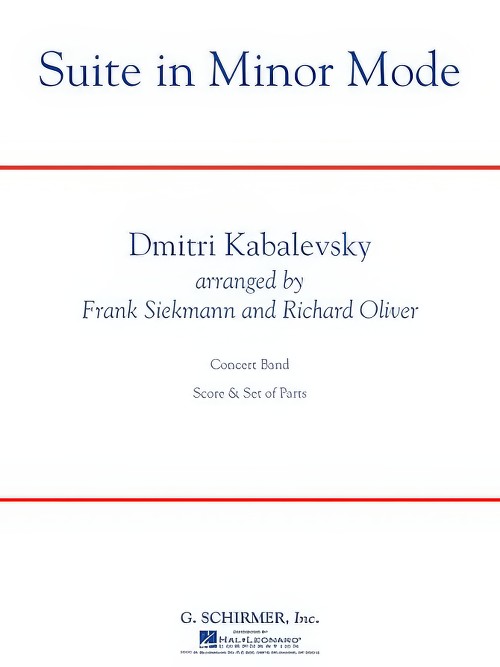 £57.50
£57.50Suite in Minor Mode (Concert Band - Score and Parts) - Kabalevsky, Dimitri - Oliver & Siekmann
Originally written for piano by Dmitri Kabalevsky, here is a marvellous collection of settings for band in contrasting styles. "Dance" is written in a moderate tempo and features a trumpet melody and active percussion writing. "A Little Song" is in a slower cantabile style, with haunting harmonies and lovely melodic lines. Finally, "The Horseman" is up-tempo and rhythmic, with a definite Russian flavour. Quality music for young players!Duration: 4.00
Estimated dispatch 7-14 working days
-
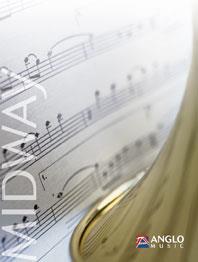 £206.99
£206.99Songs of the East Coast Fishermen (Concert Band - Score and Parts) - Sparke, Philip
100 years ago English composer Vaughan Williams visited Norfolk (an area on the east coast of England) to collect and notate folk songs from people of all trades and callings. Accompanied by a local clergyman, he visited The Tilden Smith, a pub which was a favourite haunt of the 'Northenders', the local fishermen, and in less than a week the composer had notated 61 songs. Vaughan Williams incorporated the best of these songs into his own music, most notably in A Norfolk Rhapsody and the Sea Symphony. Philip Sparke has composed this suite based on five of these folk songs together with King's Lynn, a folk song which Vaughan Williams adapted into a popular hymn tune. Why not bring a piece of traditional English heritage to any concert with this melodious work.Duration: 14:00
Estimated dispatch 7-14 working days
-
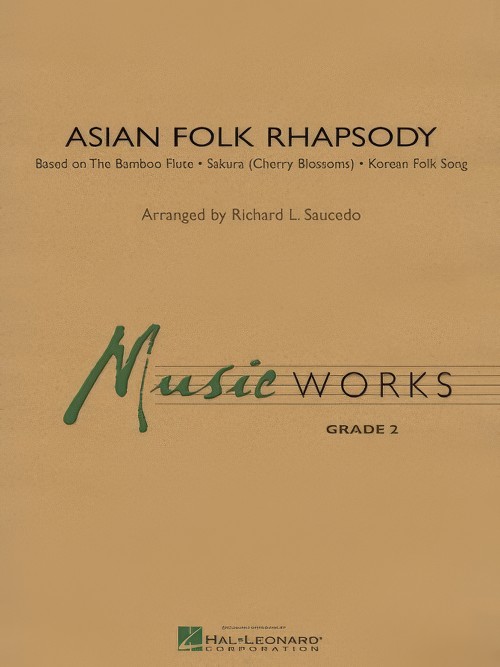 £60.99
£60.99Asian Folk Rhapsody (Concert Band - Score and Parts) - Saucedo, Richard L.
Here is a wonderfully creative and distinctive multicultural piece that will surely be a standout in any festival or contest program. Using three contrasting melodies, Richard has crafted a work that will showcase your band's capabilities in a variety of styles. Included is a quasi march treatment of The Bamboo Flute, a beautiful chorale setting of Sakura and ending with the familiar Korean Folk Song.
Estimated dispatch 7-14 working days
-
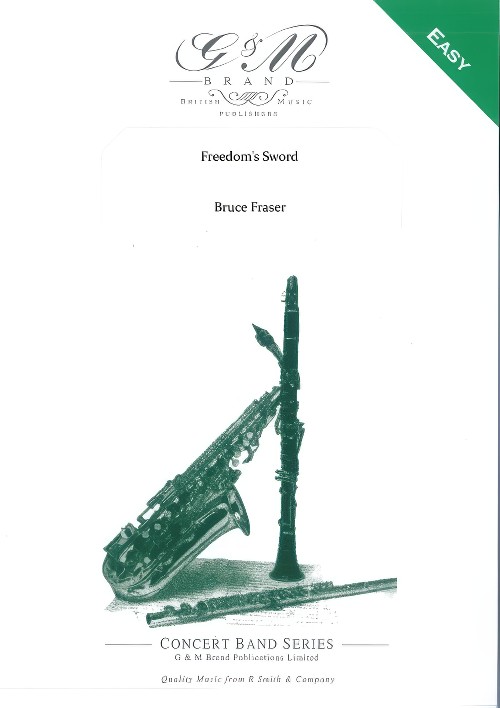 £59.95
£59.95Freedoms Sword (Concert Band - Score and Parts) - Fraser, Bruce
This work was originally commissioned by Nigel Boddice for the West Lothian Schools Brass Band to play at the European Youth Brass Band Championships in 1997 entitled Devolution to celebrate the setting up of the new Scottish Parliament. It appears in this revised version for Concert Band with the title Freedom's Sword. The opening section recalls days gone by when the Scots and English fought many a battle. The themes are derived from the well-known haunting song Ca' the yowes. The horn calls and off-stage percussion sound of a distant battle and it gradually comes closer. The centre section creates a mood of reconciliation with a dreamy Alto Saxophone solo. The last section now looks ahead with optimism and various bright dance themes appear based onTraditional Scottish reel tunes, one of which is a two-part vocal scat section The piece then heads for its conclusion including a full statement of the main theme.
Estimated dispatch 7-14 working days
-
 £11.95
£11.95Freedoms Sword (Concert Band - Score Only) - Fraser, Bruce
This work was originally commissioned by Nigel Boddice for the West Lothian Schools Brass Band to play at the European Youth Brass Band Championships in 1997 entitled Devolution to celebrate the setting up of the new Scottish Parliament. It appears in this revised version for Concert Band with the title Freedom's Sword. The opening section recalls days gone by when the Scots and English fought many a battle. The themes are derived from the well-known haunting song Ca' the yowes. The horn calls and off-stage percussion sound of a distant battle and it gradually comes closer. The centre section creates a mood of reconciliation with a dreamy Alto Saxophone solo. The last section now looks ahead with optimism and various bright dance themes appear based onTraditional Scottish reel tunes, one of which is a two-part vocal scat section The piece then heads for its conclusion including a full statement of the main theme.
Estimated dispatch 7-14 working days
-
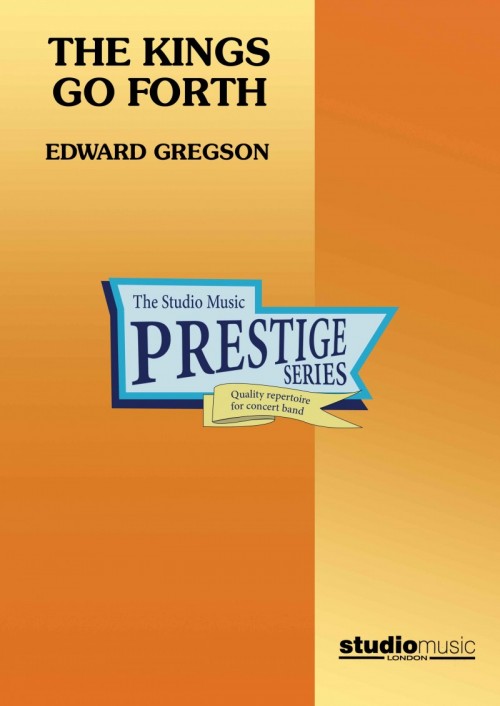 £44.95
£44.95The Kings Go Forth (Concert Band - Score only) - Gregson, Edward
This work was commissioned jointly by the Royal Air Force Music Service and an American Universities Consortium and received its world premiere during the 1996 RAF British Tour. It is scored for large symphonic wind band, with the addition of voices.The work is a sequel to the highly successful The Sword and the Crown which was premiered in 1991 by the mass bands of the RAF (and also was an RAF commission). That work was based on music written for the Royal Shakespeare Company productions of The Plantagenets and Henry IV, parts 1 and 2 (for productions between 1988 and 1991).The Kings go Forth is similarly based on musical material for those productions. It uses different thematic elements and incorporates them into a three-movement suite entitled: The Church; The People; The State.This reflects the fact that in Henry IV Parts 1 and 2, Shakespeare introduces The People as an important element in the dramatic structure. The Church and The State are, of course, both leitmotivs throughout the entire plays. An Agnus Dei is heard at the outset from a solo voice. The ensuing Dies Irae is a fast and, at times, quite violent dance. The two sections which form the basis of the second movement, The People, concentrate on popular elements and reflect to some extent the tavern scenes in the plays. The two ideas presented are a harvest hymn reflecting the country scenes set in Gloucestershire, and a jazzy, 'up-tempo' dance based on the medieval song, Sumer is icumen in. The third movement, The State, deals with the Kings theme in the title of the piece. The juxtaposition of battle music with funeral music for Henry IV and Henry VI leads to a reworking of the leitmotif from the beginning of the work. The final section is Coronation music for Henry V, eventually leading to a triumphant climax. - Edward GregsonDuration: 17.15Recorded on QPRM 125D Festival of Music 1996, Massed Bands of the Royal Air ForceRecorded on QPRM 134D The Kings Go Forth, Royal Northern College of Music Wind Orchestra
Estimated dispatch 7-14 working days
-
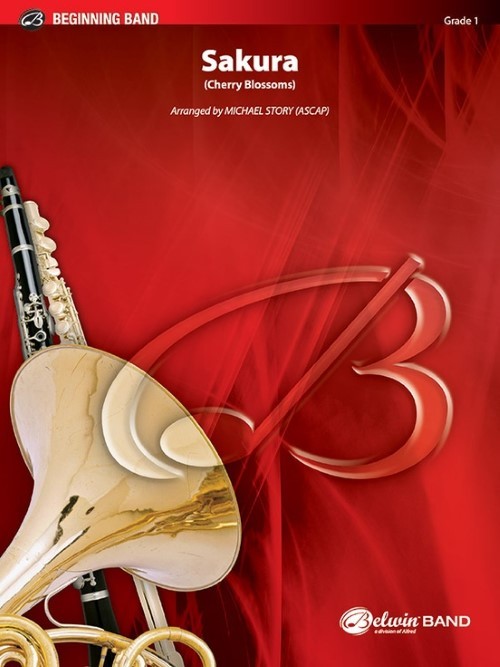 £54.95
£54.95Sakura (Cherry Blossoms) (Concert Band - Score and Parts) - Story, Michael
Sakura is an ancient Japanese children's song. It is traditionally accompanied by a koto (a long 13-stringed instrument) or a shamisen (a 3-stringed lute) and various gongs, drums and bells. This is a musical visit to a culture quite different from our own. Captivating! Duration: 2.15
Estimated dispatch 7-14 working days
-
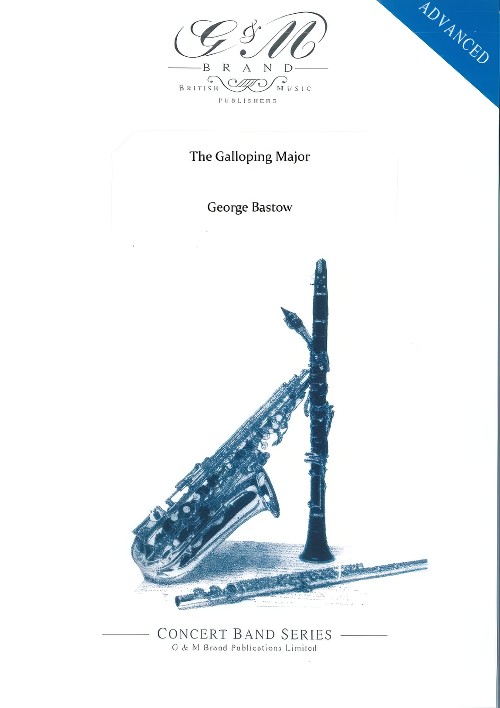 £84.95
£84.95The Galloping Major (Concert Band - Score and Parts) - Bastow, George - Jacob, Gordon
During the 1940's, BBC radio listeners enjoyed a weekly comedy programme, which starred the comedian Tommy Handley, called It's That Man Again (ITMA). A feature of each programme was a witty arrangement for orchestra of a popular or Music Hall song. These were always made specially for the programme, many were by Jacob, Gordon. The Galloping Major was an ITMA arrangement. A popular Music Hall tune from the Victorian era, in Jacob, Gordon's hands, becomes a musical gem. This new version for Concert Band, transcribed by Steadman-Allen, Ray, retains all the fun of the original.
Estimated dispatch 7-14 working days
-
 £16.95
£16.95The Galloping Major (Concert Band - Score Only) - Bastow, George - Jacob, Gordon
During the 1940's, BBC radio listeners enjoyed a weekly comedy programme, which starred the comedian Tommy Handley, called It's That Man Again (ITMA). A feature of each programme was a witty arrangement for orchestra of a popular or Music Hall song. These were always made specially for the programme, many were by Jacob, Gordon. The Galloping Major was an ITMA arrangement. A popular Music Hall tune from the Victorian era, in Jacob, Gordon's hands, becomes a musical gem. This new version for Concert Band, transcribed by Steadman-Allen, Ray, retains all the fun of the original.
Estimated dispatch 7-14 working days
